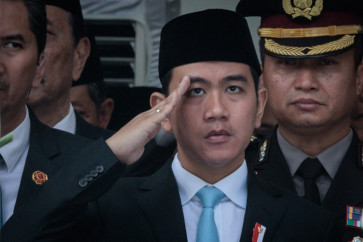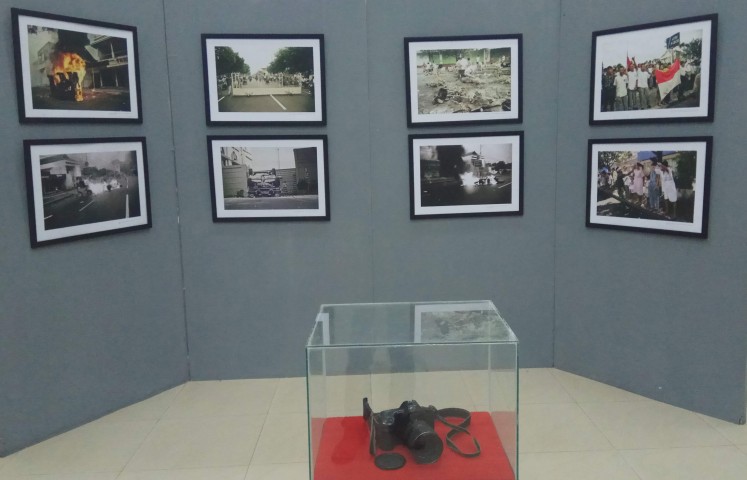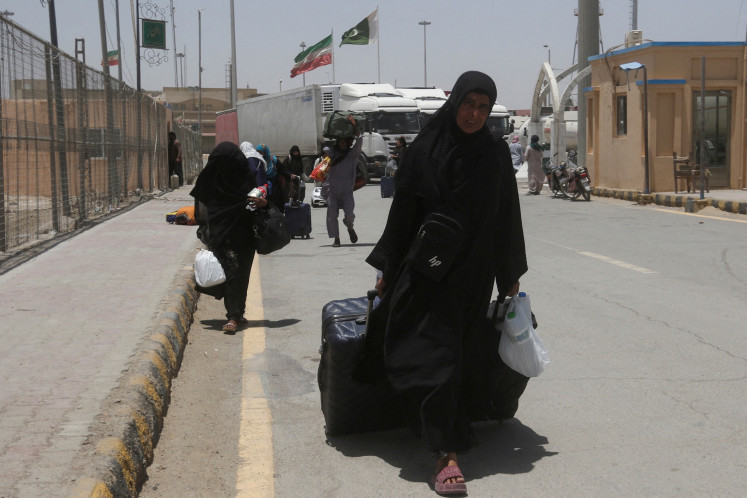Popular Reads
Top Results
Can't find what you're looking for?
View all search resultsPopular Reads
Top Results
Can't find what you're looking for?
View all search resultsOverused plot will only kill Indonesian soccer at every rebirth
Indonesia has never won AFF Cup since its inception in 1996.
Change text size
Gift Premium Articles
to Anyone

O
ne of many fundamental elements in sports is strong motivation to victory, which under good strategies and measures will lead to glory.
Such a positivity, unfortunately, is not represented in the Indonesian soccer—with endless mismanagement and weak leadership in its federation, which supposes to be the core in forming a winning team, at least in the region.
As if to cap the unimpressive run of the Soccer Association of Indonesia (PSSI) under outgoing chief Mochammad “Iwan Bule” Iriawan, a retired police general, a deadly stampede in Kanjuruhan Stadium in Malang, East Java on Oct. 1, 2022 brought the Indonesian soccer to disrepute. No less than 135 people were killed as a result of the police’s illegal use of tear gas in crowd control after the Liga 1 premier league soccer match between archrivals Arema FC and Persebaya Surabaya.
The magnitude of the tragedy, one of the world’s deadliest, was so enormous that President Joko “Jokowi” Widodo insisted that the mess was cleaned by meeting world soccer body FIFA president Gianni Infantino in person when the latter visited Jakarta.
Prior to that, Jokowi even assigned State-Owned Enterprises (SOEs) Minister Erick Thohir, former president of Italian top flight Inter Milan, to confirm that the lobbies went well, resulting in FIFA imposing no sanction to Indonesia over the stadium incident.
We’re “lucky” enough to keep hosting the upcoming FIFA Under-20 World Cup championship, despite the Kanjuruhan horror.
Indonesian soccer, already suffered from COVID-19 restrictions, went deeper in the gutter with unstable domestic competitions over the past few years.
The domestic competitions and national team’s participation in international events are among the core in the sport’s growth. But given the pandemic and Kanjuruhan incident, such a basic need is not properly fulfilled.
The stadium tragedy forced a temporary halt to Liga 1, which then resumed in early December. Most recently, there are indications the second tier Liga 2 will not run this season.
This situation has badly hit the national team, which will play the U-20 tournament in May-June and the Asian Cup in either end of this year or early next year. To perform in high-level competitions, players need time, space and opportunities to develop not just their technical abilities but also morale.
While technical skills are quite okay, morale is all that our players are lacking. The champion mentality remains elusive in the national team.
To build such a team players need as many opportunities to compete with other teams as possible, either in the national team and/or allowing them to pursue professional career internationally. Plus, get skillful naturalized players.
A significant progress shown in our 2023 Asian Cup’s Garuda squad, which along with Thailand, Vietnam and Malaysia qualified for the main event held in Qatar by end of the year. It is the first since to 2007 for Indonesia to go through to the quadrennial event.
Led by South Korean coach Shin Tae-yong, Indonesia’s run in the Asian Cup qualifiers showed progress, offered by naturalized Marc Anthony Klok, who was born in Netherlands, Witan Sulaeman and Rachmat Irianto, among others.
Klok, whose professional career included a stint in Jong FC Utrecht of the Netherlands and Dundee FC of Scotland, boosted his team’s confidence by scoring the first goal in Indonesia’s first match against Kuwait before defender Rachmat added another to secure a shocking 2-1 victory.
In the third and final match during the qualifiers, Indonesia wrecked Nepal’s defense with solid 7 goals—two of them created by winger Witan among six scorers. Throughout his three-year of professional career, 21-year-old Witan has played for Polish club Lechia Gdanks and Slovakian club Trencin.
In the recent ASEAN Football Federation (AFF) Cup, nevertheless, Indonesia failed to even reach the finals. The team, which came second in Group A behind eventual champion Thailand, bowed down 2-0 to Vietnam in the two-leg semifinals.
Indonesia, the biggest country in the region, has never won the tournament since its inception in 1996, as compared with Thailand (7 times), Singapore (4 times), Vietnam (twice) and Malaysia (once).
As the PSSI is gearing up to elect its new leader for 2023-2027 tenure on Feb. 16, our soccer development is again at stake.
Shin—the man behind South Korea’s stunning 2-0 win against Germany in the 2018 World Cup in Russia—may or may not stick around to lead our players as Iwan Bule’s tenure ends in November. This means, the national program going forward is again likely to be severely disturbed.
Indonesian soccer is on verge of going into square one, despite now the men’s team ranked 151st in the world—the team ranked 164th in 2021 and 173rd in 2020.
A similar scene had occurred when then national coach Alfred Riedl—who helped Indonesia reach the final in the 2010 AFF Cup—called it quit in 2011 due to a reported contract dispute following a highly publicized political power struggle in PSSI. At that time, Indonesia ranked 132nd.
The upcoming election for the new PSSI chief plays a pivotal role in shaping the future of Indonesia soccer.
Erick, a favorite in the race against former PSSI boss La Nyalla Matalitti, will shoulder a big burden, considering his portfolio in Indonesian sports and a potential candidate for the 2024 presidential race.
If the new chief manages to set aside all non-sport problems and genuinely takes side to players for the sake of the country’s achievement on international stage, then the bad omen will end.
If it goes the other way around, then it is crystal clear that Indonesia only takes shortcuts in handling soccer—the most loved sport and entertainment with die-hard fans within the country and overseas.
If so, it is then confirmed that “taking care of soccer” is merely an efficient ride for the five-year cycle of political event. The overused plot that has never been rewritten.
***
The author is a staff writer at The Jakarta Post.









